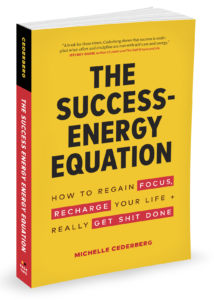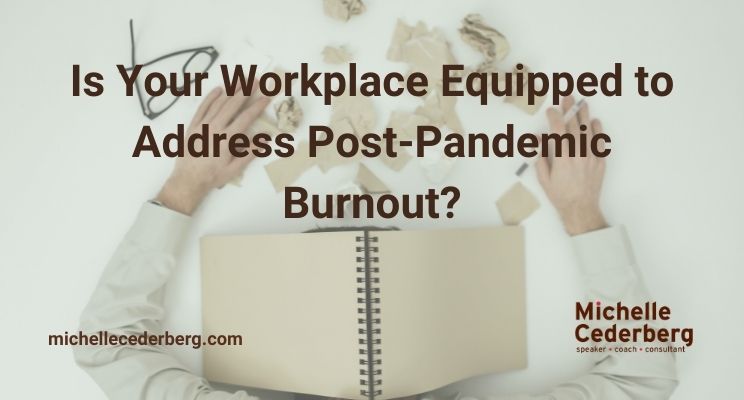“Burnout is what happens when you try to avoid being human for too long.”
~ Michael Gungor
If the last two years has you feeling less human, this message is for you. After two plus years of managing the highs and lows of the pandemic, we’re all feeling the impact of it all on our stress and mental health. I know I am.
If you want to avoid burnout, pay attention to how you feel, especially now as we square our shoulders to readapt to a post-pandemic world. We’ve wanted this for a long time, but it’s an adjustment isn’t it? And, even if it is a positive thing, stress and burnout are on the rise among Canadians.
So, I’ve decided to spend a few weeks exploring the topic of burnout: what it is, how to recognize it, and what to do about it. I’d be interested to hear your thoughts and questions around it!
Watch the video below, or read the transcript that follows, because I share a great FREE resource from the Mental Health Commission of Canada you might find helpful!
Mental Health Research Canada recently released a study which found that 35 percent of Canadian workers feel burned out; only 39 percent have been supported by their employers to deal with the psychological demands of their jobs; only 40 percent say they have help from their employers in dealing with workplace stress; and only 4 percent have workplace policies that have adapted with new Covid-19 mental-health supports (and there are a lot of supports out there).
These findings are significant, because while the pandemic is no longer front and centre the way it has been over the past two years, the long-term impact it has had on our mental health can’t be ignored, and quote frankly, we’re still trying to determine the full scope of exactly what that looks like.
Hey, Michelle Cederberg here, wondering what you’re doing to take care of yourself and your work team during these interesting times?
People are stressed. People are burned out. They’re disengaged. And in the ‘workplace’ (whatever that looks like now), they’re looking to managers and leaders to get support, and as the numbers in the study suggest, sometime the help isn’t there.
I’m not sure we can blame the managers and leaders though. They’re navigating unchartered waters with the rest of us, with some of their team working from home, many are back in the office… and a good deal are jumping back and forth with a hybrid work model.
This new world of work has brought with it different stressors, new challenges, and unforeseen work demands that many feel unequipped to handle.
So, in the weeks ahead I’m going to share some of the research I’ve been doing on stress and burnout. I’ll tackle questions like:
What’s the definition of burnout and how Covid has changed it?
Are stress and burnout the same?
How can we recognize the signs of burnout, in ourselves and in others?
What are the different types of burnout?
What can I do to reduce burnout? … and so much more.
If you have questions about stress and burnout that you’d like me to address, send me at note and I’ll do my best to tackle it.
It’s not a fun topic, but it’s an important one and I hope you’ll tune in. I’ll be posting videos on my YouTube channel, and on Instagram. Plus, I’ll be posting the transcripts here.
To kick off the conversation I want to share an eye-opening definition of burnout from Psychology Today, and below I share a great FREE resource to help you lead better in a hybrid world.
Burnout, defined:
Burnout is a form of exhaustion caused by feeling endlessly inundated. It’s essentially emotional, physical and mental stress on steroids.
It happens when you’re overwhelmed, emotionally drained, and unable to keep up with the demands of day-to-day. It hinders productivity, reduces your energy and can bring with it feelings of hopelessness, resentment and even cynicism. None of which are good for a healthy, positive work culture.
Now here’s the interesting bit. While burnout is often related to work, it can appear in other parts of our lives as well – in relationships, when the stress of parenting or caretaking becomes too much, and even as a result of two years of pandemic-pivoting… with all the highs and lows, stresses and questions, and heartbreaks and hard times, we can’t underestimate the impact that it is having on our mental health.
Do you feel that?
In the weeks to come I’ll be sharing all sorts of ways to recognize and address stress and burnout, but today I’ll keep it simple and just say, if you’re feeling stressed, it’s important to address that stress before you hit burnout.
If you can identify with my description of burnout, honour that you may need a bit of time, support and self-care to start feeling better.
Ask for help, make sure you take your breaks, and do something every day just for you… a walk, a nap, a nice meal, time with a friend… And when all else fails, just breathe and remind yourself that it’s okay to put yourself first.
Because it is.
AND, here’s a link to download The Manager’s Toolkit which is a free resource developed by the Mental Health Commission of Canada.
The Toolkit contains resources to help you lead better in a hybrid work environment, and part of that is recognizing declining mental health in your employees, and protecting your own mental health. There’s some really useful information there.
Join me on Instagram or subscribe to my YouTube so you know when each new video drops!
And if you’re interested in having me come to your organization – virtually, or in-person anywhere in North America and beyond – to talk about this topic or any others related to stress management, resilience and post-pandemic success, pop me an email at hello@michellecederberg.com. I’d love to chat, because when you address workplace stress you drive success!
Until next time I’m Michelle Cederberg reminding you we’ve got one chance to do this life, I say Dare to Live It Big, and if you’re feeling stressed or burnt out, dare to take small steps to strengthen your mental health. You deserve it.
![]()
Resources Galore!
♥ Does your workplace need a good dose of Post-Pandemic Burnout Prevention? Ask me about my half and full day Success-Energy Rest sessions to help you regain focus and recharge your health and productivity in this new world of work. Contact me to chat.
 ♥ Buy my new book via my website and I’ll send you a signed copy!
♥ Buy my new book via my website and I’ll send you a signed copy!
♥ Don’t forget to sign up for my 6 Day Work-Life Reset. This is the perfect time to do it, and it’s free, so click the link, and get going!
♥ Sign up for my socials below, because there’s all sorts of interesting stuff coming down the pipe.
Michelle Cederberg, CSP, MKin, BA Psyc
Empowering today’s dreamers, leaders and go-getters to create the life and career they want.
![]()
www.michellecederberg.com
403-850-5589
Get Social with me on:
![]()
Instagram
My Facebook Page
Twitter
LinkedIn
YouTube


